From Corner Store to Corporate Gym Bore
For 80 years, a pair of family-owned businesses occupied a spot at Fairfax & North Stuart before a commercial gym took their place.
If you have a topic you’d like me to cover in my Substack, feel free to leave me a comment or send me a message!
For seven straight years, Arlington has defended its title as the Fittest City in America (nevermind that we’re a county and not a city). In 2018, the first year of our streak, we earned a shoutout from Weekend Update host Colin Jost.
If there were ever any doubt as to our title, one could simply count the gyms in the neighborhoods of Clarendon and Ballston to clear things up—Cut Seven, CorePower, BASH, Urban Boxing, F45, Barry’s, barre3, VIDA, SoulCycle, Gold’s Gym (did I miss any?). Recently, a new gym joined their ranks at 4233 Fairfax, next door to Subway and 7Eleven—Performance360. But what was there before the latest addition to a 12-gym nationwide chain moved in?
The Groves
The first owners of 4233 Fairfax are listed as Grace & Z.B. Groves of 934 North Stuart Street. Grace was born Grace Helen Stephenson in 1874 to parents Ferdinand D. Stephenson and Martha J. Stephenson. Ferdinand was a colonel with the 152nd Regiment Illinois Volunteer Infantry and fought for the Union during the Civil War.
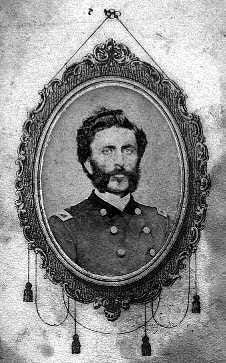
A 1965 article, “Recollections of a Doctor’s Wife”, by Mary King Welburn, provides an early glimpse of 4233 Fairfax and Grace’s time in Arlington.12 It is worth quoting at length:
[Dr. Welburn] was encouraged by Dr. Corbett of Columbia Pike, Dr. Tunis Quick, and Dr. Fadley of Falls Church to start a drug store [in Ballston] as all prescriptions then had to be filled in Georgetown.
In 1906 he built a building which is still standing in the 900 block of Stuart Street. The first floor contained the store and his offices with the living quarters above. In front of the building he had laid the first sidewalk in the County; it is still there…
The Postmaster at Ballston was killed in a tragic accident on the Electric Railroad between Rosslyn and Clarendon. Doctor [Welburn] asked if he could make room for the Post Office in the drug store. We decided to try it and boxes were built and supplies moved in. I passed the Civil Service examination and was appointed Postmaster, a position I held until 1917 when Doctor {Welburn] volunteered for service in the Medical Corps of the U.S. Army in World War I and sold the drug business.
In the meantime, we had bought an acre of land between Glebe Road and Georgetown Road (Wilson Blvd.) and remodeled the long-vacant farm house into offices and dwellings where we moved in 1912. When we moved out in 1941 the Red Cross used it as its Headquarters and now Hecht’s store stands on the site.
With the influx of more people into the Country after World War I, the Post Office Department officials wanted to start a Rural Delivery Service and insisted on our moving to the to the old railroad ticket office on what is now Fairfax Drive. (The Garden Market is now at that location). I worked more hours at the Post Office and as the Doctor’s practice was now larger he had to employ a pharmacist.
My long time friend, Grace Stephenson White of Herndon, Virginia, was glad to move here, rent our former house, and help in the Post Office. She later bought this house and the drug business and became Postmaster.
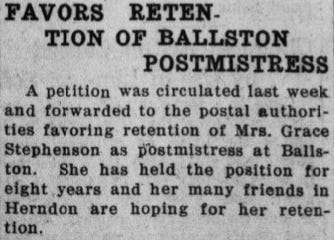
In 1904, Grace married William Lauck White of Herndon, and they had one son, William Stephenson White. In 1925, after the couple had moved to Ballston, White passed away. Grace eventually remarried, becoming Grace Stephenson White Groves. Her husband, Zebedee “Z.B.” Jacob Groves, had also been married previously, to Nannie Amelia Hitt. However, it was divorce, not death, that ended their marriage.3
Z.B. Groves, previously a resident of Remington in Fauquier County and of Falls Church, operated a general contracting business at 934 North Stuart.4 In 1950, a column in The Sun recognized Groves as “so far as we know the only man in Arlington who makes a specialty of moving houses from one location to another[.]”
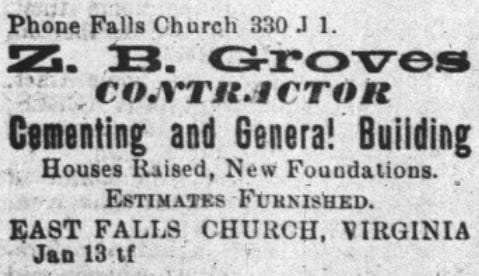
Groves was also responsible for the Benjamin Franklin Elliott coal trestle in East Falls Church. Elliott inherited the first known coal business from his father, Joseph Cornelius Elliott.5
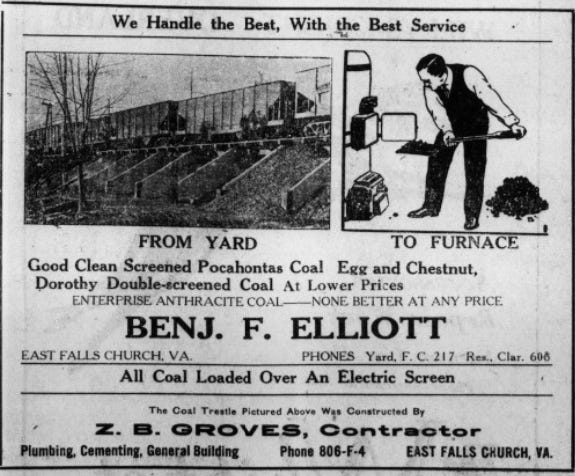
On January 14, 1957, Z.B. Groves passed away, leaving behind Grace, three daughters, and a son. The property at 4233 Fairfax also passed to Grace, though not for long. On November 15, 1957, Grace passed away at Iliff Nursing Home in Dunn Loring. Her obituary noted that “[s]he spent many years in Herndon…[and] [s]he has many friends among the older residents of Herndon.” After 11 months in her care, 4233 Fairfax passed to her son, William. Grace’s estate was administered by Oren Ritter Lewis, a private attorney who in 1960 was appointed by President Eisenhower to serve as District Judge for the Eastern District of Virginia.6
Operation Garden Market
The property at 4233 Fairfax eventually passed to Nellie Rusk (née Groves) of 19 North Trenton Street in 1964. However, two decades prior to these passings and property transfers, a market had sprung up at the corner of Fairfax & North Stuart. If you’ll recall from Mary King Welburn’s article, in 1965, the “Garden Market” occupied what was once the rural post office and the railroad ticket office. The “Garden Market” is referring to Super Garden Market, which opened for business in 1941 with Aaron Thaler and father Emanuel at the helm.
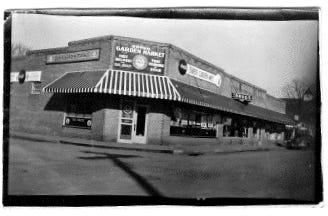
Aaron Samuel Thaler was born September 6, 1911. In July 1942, at 31, he was drafted into the U.S. Army. Thaler spent some time in Virginia Beach before being shipped to the Pacific Theater of World War II, and he served as both a military policeman and an Army Criminal Investigation Division agent.
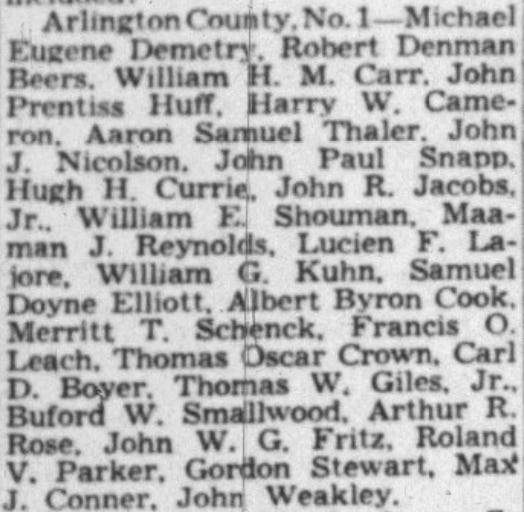
Thaler, like his longtime landlord Grace Groves, was also a widower. His first wife, Charlotte Goldstein, was a 1st Lieutenant with the Army Nurse Corps during World War II. Together they had two daughters, Marcia Phyllis Thaler and Stephanie P Rosen.7 Goldstein passed away in 1963 and is buried in Arlington National Cemetery.
In 1965, Thaler married Frances Abramson Alpert, herself a widow. Her first husband was Seymour Alpert (d. 1957), with whom she had a son, Brian, and a daughter, Cynthia.8 After marrying Thaler, Frances moved to Falls Church and became the bookkeeper for Super Garden Market.
Postwar Prosperity and Metro Boom
Brian Alpert, who wrote about Super Garden Market on his website rhumba.com, told me that the Ballston in which his stepfather’s store opened was “a collection of small homes and bungalows.”9 However, the market would soon benefit from a wave of American postwar prosperity, as Arlington “experience[d] substantial residential development.”
Another factor that contributed to Super Garden Market’s longtime success was the arrival of the Metro. While many businesses along the Ballston-Rosslyn corridor were forced to relocate or shutter due to construction, Super Garden Market thrived. As Tom Shean wrote in the Northern Virginia Sun in October 1976:
Each weekday scores of Metro workers building the Ballston subway station buy meals and drinks at the grocery store-carryout on Fairfax Drive and North Stuart Street. The store sells as many as five hundred cups of coffee a day, and during summer months soft drinks are often gone before they are cold.
Lee Russell, whom the article refers to as “son of the Super Garden Market’s first proprietors”, estimated that Metro workers accounted for half the store’s business. Russell—who married Marcia Phyllis Thaler, and is thus son-in-law of the original proprietors—explained that the store used to be “‘your old-time family grocery store with personal service’” but congestion caused the grocery part of the business to slow. In a bit of foreshadowing, Russell also added that he expected drastic changes in Ballston within the next ten years and that high-rises would likely crowd out the market. “‘It’s going to happen’” Russell said, “‘the only question is when.’”
The End of an Era, the Beginning of Another
In 1989, Super Garden Market, which had since become Super Garden Deli and Market and, according to Brian Alpert, moved across the street, announced it was closing after nearly fifty years in business.10 Thaler, now 78, wept as he spoke about the closing with The Washington Post. “‘I knew eventually it was coming," Thaler said. “‘I sort of pushed it off all the time, day by day.’” The Post noted, somewhat cynically, that while the “laments are sincere, there is some irony in the mourning for the passing of a neighborhood institution” as many patrons were “part of the changing development scene, brought to Arlington to work in the proliferating high-rise offices.” These proliferating high-rises workers also brought enormous success to Super Garden Market, for a time. From a small, “old-time family grocery”, the market grew to a 25-employee operation, bringing in $1.5 million in annual revenue. And, as Brian Alpert wrote, the market “for the past 47 years fed, clothed and housed the Thalers, the Alperts, and now the Russells; propelling these families into Middle Class Luxury.”
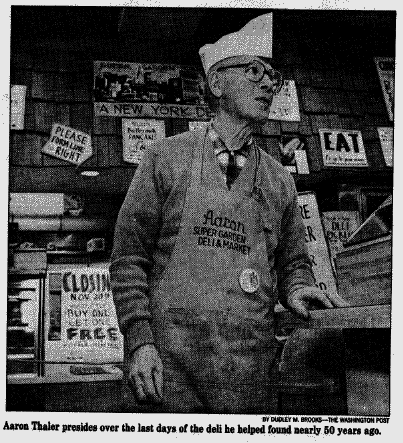
In 1989, on the eve of Super Market Garden’s closing, the Oliver Carr Company took over the remaining years of the market’s lease, a move orchestrated by, according to Brian Alpert, Lee Russell. Oliver Carr was managing a development that would replace the row of shops of which the market was a part—a 14-story office building and a 24-story residential tower, with a park thrown in as a courtesy to Ballston residents. The company offered to let the market reopen as part of the new development, but the family demurred. As Russell put it, “the family won’t even think about that for now.”
Across the street at 4233 Fairfax, things were also in motion. In 1966, 4233 Fairfax had left the Groves and passed to Charles P. Jacobsen, III, followed by a series of entities named Monticello Associates, Monticello Partners LLP, and Monticello Partners c/o The Winfield Group. In 1990, one year after Super Garden Market closed, Scott J. Lang incorporated Lang’s Garden, Inc., at 4233 Fairfax with fictitious name “Hunan Gate” and himself as president. In the roles of vice president and secretary were his father, Wen Lu Lang, and mother, Li Ying Yang, respectively.
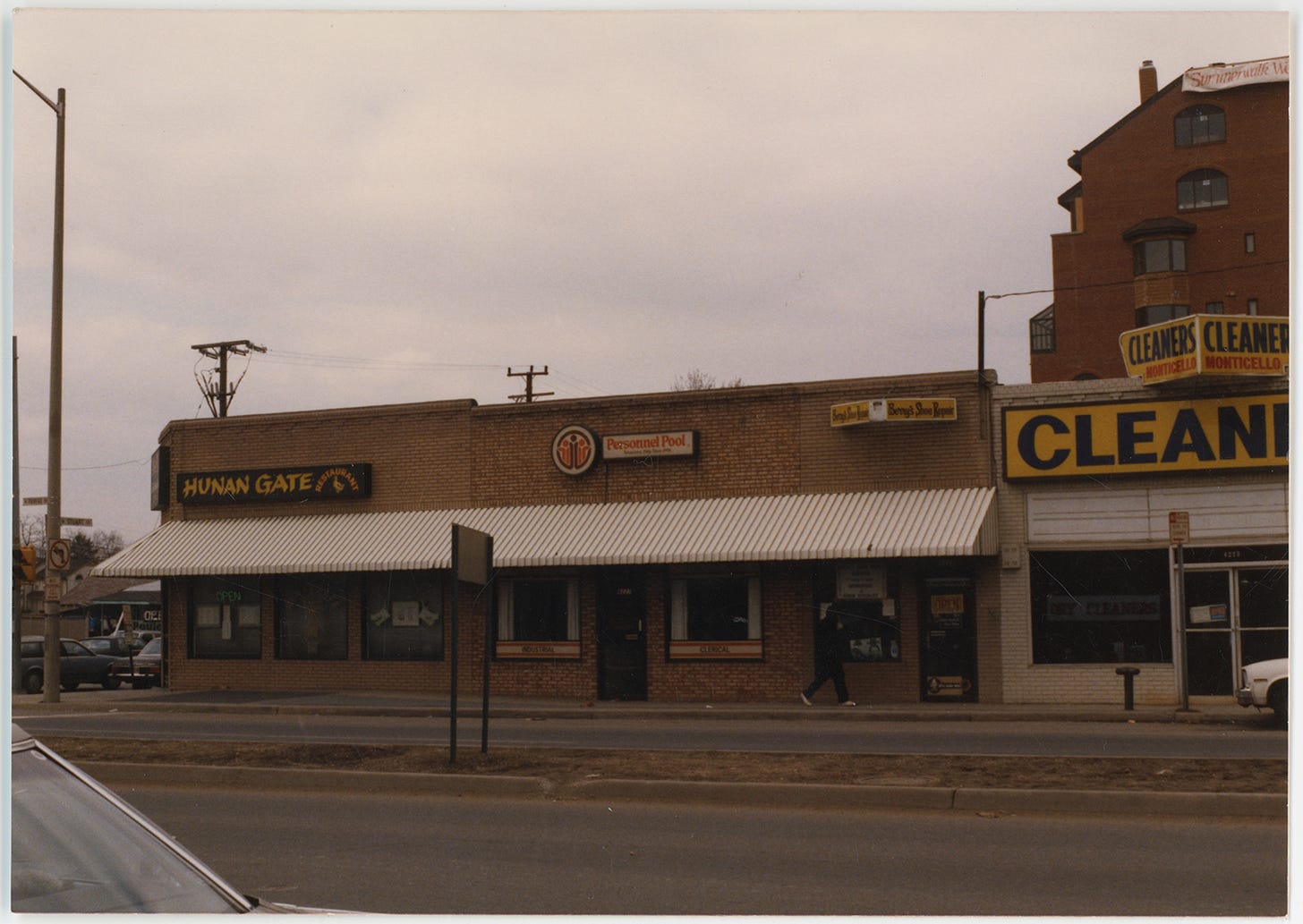
Hunan Gate, the second family-run establishment to occupy 4233 Fairfax, was a restaurant specializing in dongbei (东北), or northeast, Chinese cuisine. But the dongbei dishes were only available on a “secret” menu. As Tyler Cowen, an economist, wrote in his Ethnic Dining Guide:11
On the surface a mediocre Hunan place, but underneath there is a Manchurian menu, originally in Chinese only but now parts are in English. Order from that! No other place around tastes likes this one…
This place is getting better. Definitely recommend!
Unfortunately, there is not a lot of information in the public realm about the Lang family.12 What I did find is that Li Ying Lang passed away in 2022 at the age of 86. Two years later, the family decided to close the restaurant and retire after more than 30 years in business. Today, the family resides in the Falls Church area.
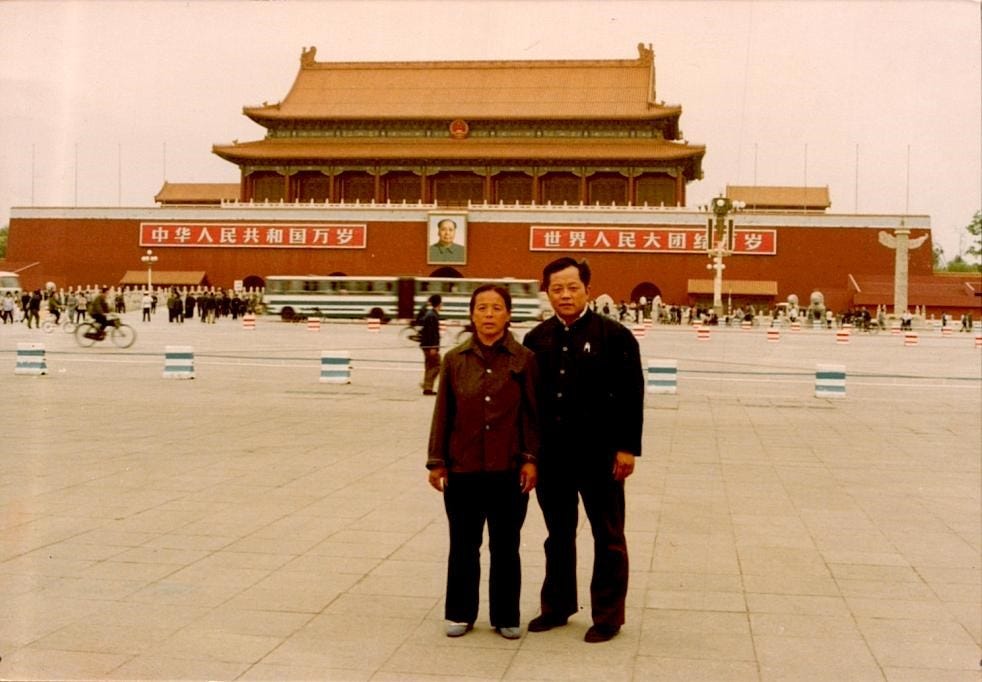
Yet Another Gym and a Copycat
In April 2025, Performance360, another gym, opened its doors at 4233 Fairfax, joining the ranks of CVS, Starbucks, and now even Compass Coffee, as one of the businesses Arlington has a seemingly endless supply of. As one commenter on ARLnow put it:
Oh geez, not another gym. It's like they're in a race with vape shops to see who will win most locations in Arlington. While Hunan Gate was not good, I miss all the family owned Chinese places that used to be around here. Actually I miss all the mom and pop and hole in the wall type places that used to be here. Arlington, at least N. Arlington, seems to be losing any character it once had.
With neighbors Subway, 7Eleven, and a vape shop, it would seem this small row of shops doesn’t have any character left to lose.
Down the road, at 3444 Fairfax, another Super Garden Market briefly tried to capitalize on the original market’s good reputation. As owner Asefaw Redai Sultan put it in 2023, “[w]e’re renewing the name…we hope [everyone] comes back.” However, Sultan clarified, there was no relation between his store and the original. As if to emphasize that point, Sultan’s store closed after just one year in business.
Postscript
I want to thank Brian Alpert for generously allowing me to use his photos for my article and for his website, rhumba.com, which provided invaluable historical information about Super Garden Market. Here are some humorous hand-lettered signs that didn’t make it into the article but which the market used to display.
According to a 1979 Post article, another sign the market was known to display was a warning that “Taste Makes Waist.”13
Welburn Square in Ballston is named for Dr. Williamson Crothers Welburn, an Arlington physician and Mary’s husband. See “Welburn Square”.
The Arlington Historical Magazine, Vol. 3, No. 1, October 1965.
Interestingly, Z.B. and Nannie are buried together in Columbia Gardens. See “Zebedee Jacob Groves.”
Was this the building in the “900 block” where Dr. Welburn operated his drug business?
See “Benjamin Elliott’s Coal Trestle” for more information.
Because the CIA and Pentagon fall under the purview of the Eastern District, Lewis often heard cases related to the two agencies. In 1978, Judge Lewis ruled that Frank Snepp, a former CIA strategy analyst, violated federal government rules regarding prepublication review when Snepp published Decent Interval, a book of his experiences in Vietnam that was critical of the Agency.
In 1967, Lewis jailed author Norman Mailer following the October march on the Pentagon, which Mailer chronicled in his book, Armies of the Night.
Marcia became a music teacher and worked at Arlington schools from 1975 to 1979. In 1990, she passed away from cancer. See “Influential Columnist Richard L. Strout Dies”.
Cynthia passed away in 2013 at the age of 58 from breast cancer. She was a Senate staffer and speechwriter and she served on Hillary Clinton’s Health Care Reform Task Force.
The name of Alpert’s site comes from his favorite rhythm, rhumba, also known as “mambo”. Alpert is a jazz musician.
According to Alpert, the relocation coincided with the opening of the Ballston Metro station in 1980. See “The Original Super Garden Market”.
Cowen is the author of a book, An Economist Gets Lunch: New Rules for Everyday Foodies, and is currently the director of the Mercatus Center at George Mason University, a libertarian-leaning think tank. In Cowen’s words, “[r]restaurants manifest the spirit of capitalist multiculturalism.”
In fact, the only mention of the restaurant in a major paper was in 2007, when The Washington Post reported it was the victim of a break-in.
This sign was shared with the post by Ishmael Cleveland “Buck” Goings, an 89-year resident of Arlington and a 34-year employee with the U.S. Post Office. Goings passed away in 2003. See “Buck Goings Obituary”.








